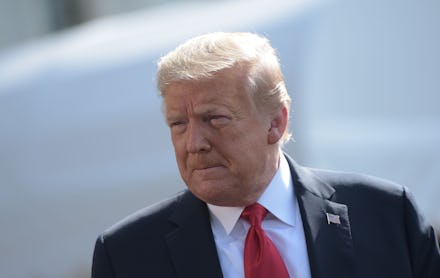Trump says protesters who destroy racist statues should go to jail for 10 years

Following the police killing of George Floyd, protests have taken place in all 50 states. In each city, protesters flock to different locations; in Minneapolis, the 3rd police precinct burned. But across the country, statues have become a popular target, as demonstrators try to topple monuments to Confederate generals or well-known racists of history. Now, President Trump is calling for protesters who deface or destroy statues to face prison time.
In the past, protesters have mostly focused on obviously racist statues like Confederate monuments toppled in Richmond, Virginia, or defaced in Boston and Miami. The ongoing civil uprisings have called for a more expansive analysis of racism in the United States, though, including pointing at the dirty legacies of presidents.
On Monday night, police in Washington, D.C., used mace to clear protesters in Lafayette Square outside of the White House. There, protesters were trying to bring down a statue of former President Andrew Jackson, who owned hundreds of slaves, loathed abolitionists, and signed the Indian Removal Act.
This isn't the first time police used chemical weapons on protesters in Lafayette Square. Earlier this month, protesters were tear-gassed so Trump could have a photo op outside of a church. It seems Trump is continuing his beef with protesters there, as he climbed onto Twitter on Tuesday morning, writing, "I have authorized the federal government to arrest anyone who vandalizes or destroys any monument, statue, or other such federal property in the U.S. with up to 10 years in prison, per the Veteran’s Memorial Preservation Act, or such other laws that may be pertinent."
In a second tweet, Trump said that the action is "effective immediately" and could also be used retroactively. He added, "There will be no exceptions!"
Enacted in 2003, the Veteran Memorial Preservation and Recognition Act makes attempts to damage or destroy monuments commemorating veterans punishable by up to a decade in prison. However, it's not clear if that applies to every statue that protesters have gone after.
Carl Tobias, who holds the Williams Chair in Law at Richmond University, told Business Insider that Trump "may have some leverage to try to protect certain federal monuments, but it is unclear that the federal law he cites does that."
Still, it may not matter. White House correspondent Yamiche Alcindor tweeted that Trump plans to sign an executive order regarding defacing or removing statues. And either way, Tobias told Business Insider that Trump's threat "as many others seem to be aimed at his base," and is essentially a way for him to shore up support.
Performing on social media for his base is a strategy that Trump uses constantly, like when he tweeted about liberating Democratic states or threatened Minneapolis protesters. At his rally over the weekend, Trump also made comments about creating legislation where "if you burn the American flag, you go to jail for one year."
Trump's remarks on flag-burning were prompted by an incident in Portland, Oregon, where protesters toppled a statue of George Washington, wrapped it in an American flag, and set it on fire. But the president's comments ignore that the Supreme Court ruled in 1989 that flag-burning is protected speech under the First Amendment.
The thing about defacing or removing statues is that protesters aren't really concerned about legality. The point of protests is to question the status quo — which includes the construction of monuments to slave-owners and settlers in a country where Black and Native American communities continue to suffer. Trump may be able to go after protesters in the courts, but it won't deter people from protesting.